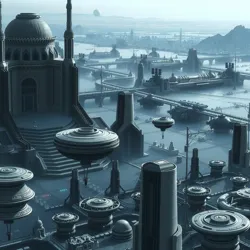Galactic Civilizations
Galactic civilizations are advanced societies that have expanded beyond their home planets to inhabit and govern multiple star systems within a galaxy. These civilizations, often depicted in science fiction, face unique challenges and opportunities as they navigate the complexities of interstellar governance, resource management, and cultural integration.
Overview
Galactic civilizations typically arise from the technological and social evolution of a species capable of achieving faster-than-light travel. This capability enables them to colonize distant worlds and engage in Interstellar Communication with other civilizations. The vastness of space and the diversity of planetary environments demand significant adaptability and innovation from these societies.

Government and Politics
The political structures of galactic civilizations vary widely, ranging from centralized empires to loosely organized federations. The Galactic Council of Systems is a common governing body that represents the interests of various member planets, facilitating diplomacy and conflict resolution.
Types of Governance
- Imperial Systems: Often characterized by a single or ruling elite, imperial systems exert control over vast territories and populations through a hierarchical structure.
- Federations: Composed of multiple autonomous regions or planets, federations rely on cooperation and consensus for decision-making.
- Confederacies: These are loose alliances of independent systems that collaborate for mutual benefit but maintain significant sovereignty.
Economy and Trade
The economies of galactic civilizations are complex, involving the exchange of goods, services, and information across light-years. The advent of Quantum Entanglement Communicators has revolutionized economic transactions, allowing instantaneous communication and reducing delays in trade negotiations.
- Resource Management: Efficient resource management is crucial, as planets vary in their natural resources. The Stellar Mining Consortium is a major player in extracting and distributing essential materials.
- Trade Routes: Establishing and protecting trade routes is a significant aspect of galactic economics, often involving strategic partnerships or military protection against piracy.
Culture and Society
Galactic civilizations are melting pots of diverse cultures, each contributing to a rich tapestry of traditions, languages, and art forms. The Intergalactic Cultural Exchanges program facilitates the sharing of cultural artifacts and knowledge, promoting understanding and unity.
Challenges
- Cultural Integration: Balancing cultural preservation with integration is a challenge, as exposure to multiple cultures can lead to both enrichment and conflict.
- Ethical Considerations: The dissemination of technology and ideas raises ethical questions about cultural influence and dominance.
Technological Advancements
Technological innovation is a hallmark of galactic civilizations, driven by the need to overcome the limitations of space travel and communication. Key technologies include:
- Faster-Than-Light Travel: Essential for exploration and expansion, with propulsion methods like warp drives and hyperspace tunnels.
- Advanced AI and Robotics: Used for everything from autonomous exploration to enhancing daily life on colonized planets.
See Also
- Interstellar Diplomacy
- Galactic Defense Forces
- Astroengineering Projects
References
- Exploration of political systems within the Galactic Council of Systems.
- The role of Quantum Entanglement Communicators in economic development.
- Cultural initiatives under Intergalactic Cultural Exchanges.
Galactic civilizations represent the pinnacle of societal evolution in the universe, embodying the challenges and triumphs of interstellar existence.